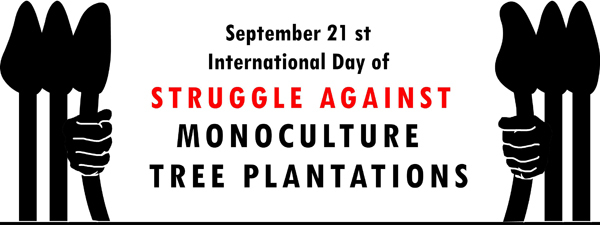“Every year since 2006, we commemorate the International Day of Struggle against Tree Monocultures on September 21st as a way of breaking the circle of silence around the violations faced by the communities whose territories are invaded and surrounded by industrial tree plantations – including eucalyptus, pine, acacia, rubber and oil palm. These large scale monoculture tree plantations require significant use of water, agrotoxins and chemical fertilisers, and occupy huge areas that many people live in or depend upon,” says Winfridus Overbeek, coordinator of World Rainforest Movement, one of the organisations that has signed the declaration.
This year the focus is on the impacts of oil palm plantations, which have expanded the fastest in recent decades. A series of free trade agreements has removed most protections against such plantations in many countries. Increasing demand for agrofuel from Europe is responsible for rapid expansion in Indonesia and Malaysia as well as those countries in Africa and Latin America with the climatic conditions to grow oil palm.
The current attempts to “green” the industrial oil palm sector and other large-scale plantations with commitments to “zero deforestation” are only making matters worse. “Corporations are not interested in protecting the welfare of local populations or the genuine conservation of habitats and species; they are interested in the forest only as a store for carbon and biodiversity, as a potential source of carbon and biodiversity credits that can be sold to polluting countries and companies,” says the Declaration.
Certification schemes such as RSPO try to “improve” plantations while maintaining the logic of unlimited expansion. But there is no way to make large-scale industrial tree monocultures acceptable, neither for local communities nor for a world facing a severe crisis with manifold symptoms, including climate change, economic and environmental deterioration and increasing militarization and human rights violations.
“In the countries where industrial oil palm plantations occupy large areas of land, governments should give absolute priority to the demands of the communities and support their control over the lands and forests they depend on rather than adopting policies that facilitate handing these territories over to transnational companies,” say the signatory organisations.
The Declaration ends by urging governments to invest in local diversified food production and food sovereignty, as the best way to support communities and also local and national economies as well as to promote more environmental and social justice.
Read the full text of the declaration here: http://wrm.org.uy/actions-and-campaigns/international-declaration-21-september-2015/
Signatories to the Declaration
Acción Ecológica, Ecuador; Brainforest, Gabon; CALG - Coalition against Land Grabbing, Philippines; Censat Agua Viva, Colombia; Centre pour l'Environnement et le Développement - CED, Cameroon; COECOCEIBA - Amigos de la Tierra Costa Rica; Colectivo de Reservas Campesinas y Comunitarias de Santander, Colombia; Consumers' Association of Penang, Malaysia; ERA/FoE Nigeria; FASE/ES, Brasil; Friends of the Earth International; Fundaexpresión, Colombia; GRAIN; JA! / FOE Moçambique; Observatorio Latinoamericano de Conflictos Ambientales - OLCA; organisación Ambiental Chinampa, Colombia; organisación Fraternal Negra Hondureña - OFRANEH, Honduras ; Otros Mundos, México; People Common Struggle Centre – PCSC, Pakistan; Red latinoamericana contra los monocultivos de árboles - RECOMA; Sahabat Alam Malaysia / FOE Malaysia; SAVIA, Guatemala; Sawit Watch, Indonesia; School of Democratic Economics - SDE, Indonesia; Third World Network, Malaysia; World Rainforest Movement - WRM
